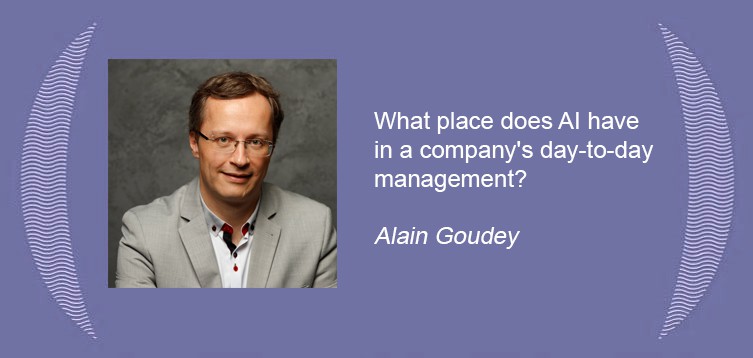What place does AI have in a company’s day-to-day management?
Published on 11/18/2021
Thematics :
What place does AI have in a company’s day-to-day management?
Published on 11/18/2021
What is the role of artificial intelligence (AI) within the company and in management? Is it possible to manage an AI? To manage with AI? A response from Alain Goudey, NEOMA Chief Digital Officer.
AI was defined in 1956 by Professor John McCarthy as “the science that produces intelligent software”. This definition shows that AI is not a recent phenomenon, that it is a science (combining mathematics and computer science) and that it involves software and therefore algorithms (AI).
AI is currently used in the health sector (pathology detection), in security (behavioural analysis), in industry (predictive maintenance of components), and in business too. All these applications ought to boost French productivity by 20% by 2035 and perhaps lead to the automation of 57% of jobs in OECD countries. Admitting that there is a place for AI in management is tantamount to giving AI a Human Resources management position in the company. AI could thereby play a role in the recruitment and supervision of teams, in decision-making or in the implementation of the company’s strategy. In practice, this move has already begun, but should AI itself be managed (and how)?
Many recruitment tools give companies the possibility to use AI to accelerate and optimise the recruitment process. Uses include scoring a candidate’s profile based on their CV, matching a candidate to a job vacancy and conducting automated recruitment interviews. These tools are generally operated through machine learning and their configuration requires the algorithm to be driven by positive (or negative) feedback on the choices made by the algorithm: the candidate is right (or not) for the position, the interview was effectively positive (or not), etc. The difficulty of HR feedback should not be ignored, as the absence of feedback means that the recruitment algorithm will be less effective (as there is less learning and less data).
This demonstrates that AI must be controlled by the manager in all cases: if you feed in biased data, the algorithm will give biased answers. Furthermore, it can be said that, at the outset, the algorithm is more or less “stupid” because it has not learned enough. The question of data quality, its integrity (absence of bias) and its availability (a lot of data is required) are major points for any AI. Managing AI is indispensable and amounts to the management of its data.
Managing an algorithm is simple: you just have to provide it with data. However, you still have to manage your own human approach with regard to the answer supplied by the machine: do you have complete trust in the machine (or more precisely in the team that developed the machine) or are you that sceptical being who systematically challenges the answer? IBM has shown that the alliance between AI and humans is even more effective than the machine alone in the medical field, and yet the machine alone is more effective than the human alone…
However, managing a human is much more complex because, in addition to the information (data) we share with them, we need to be sure about their commitment, motivation, emotional state, understanding of the problem and their ability and availability to deal with it…
Plus, more and more AI algorithms being set up to understand facial expression, gesture, speech patterns, texts, tone of voice, rhythm, choice of vocabulary and using these signals to detect an person’s emotional state. Perhaps this is the beginning of AI-augmented management with an AI coach alongside every manager to help improve their relationship with their team?
This article was originally published in French by Le Monde des Grandes Ecoles, on September 21, 2021. IA et recrutement : nouvelles perspectives pour l’entreprise. in Monde des grandes écoles et universités LE MAGAZINE • N°96 • 2021

